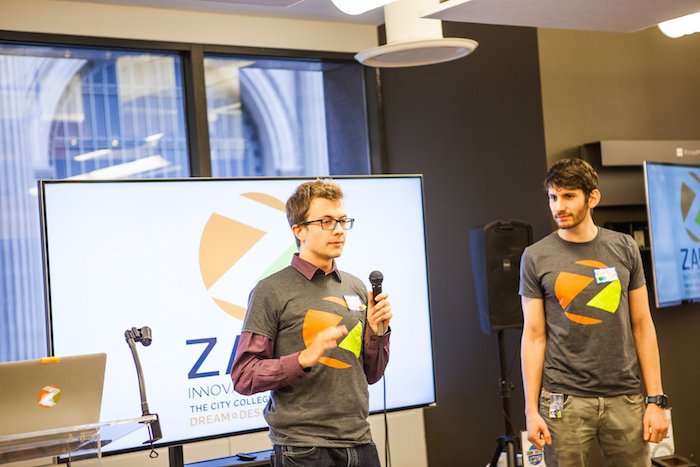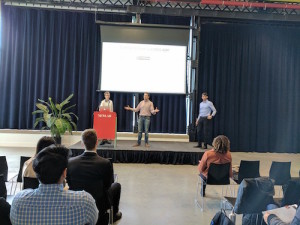Katherine Olives

When I first met SyStem, a startup competing for the Zahn Social Impact prize, I asked them if they could grow a mango as if it was freshly picked in Haiti (feel free to dispute me, but Haitian mangoes are the best mangoes). After looking at me like I was crazy, they told me their kitchen garden computer would have to be big enough to grow a tree (oh, right, duh), but it could be done. Since then, Ive been fascinated by their cutting edge idea.
I sat down with the SyStem team, made up of Adrian Logan, a junior computer engineering major; Alex Babich, a senior computer engineering major; and Dan Nelson, a consultant with years of startup experience, to learn more about this venture. The conversation quickly turned into a discussion about the intersection of technology and agriculture (Agtech), and how the way we grow food is rapidly changing.
The Zahn Center: Having always wanted to open my own farm-to-table restaurant, Im pretty fascinated by this idea. How did it all get started?
Alex Babich: Last semester, Adrian and I were working together on some other projects and we thought about joining the Zahn Competition. I had an idea for an app, Adrian wanted to do hardware, and he introduced me to this challenge out of MIT to build a food computer.
Adrian Logan: Essentially, youd use technology to grow food instead of traditional methods. It allows you to grow food anywhere, regardless of soil, access to sunlight, etc. Its especially exciting for people in urban environments.
ZC: And what attracted you to this food computer challenge?
AB: There are so many huge problems in agriculture. Food is grown so far away from where its being consumed, or were consuming food much later than when its grown. This is a pain point for a lot of people–and its only going to get worse as available farmland is depleted–so we decided we wanted to try to solve it.
AL: Seriously, when is the last time youve had a fruit or vegetable that tasted good? Im originally from upstate, so Ive always had the luxury of eating right off the vine. Now that I live in the city, I forget about the beauty of it…it just makes more sense to grown food where you are.
ZC: Right, this brings me back to my mangoes. The mangoes at my fruit stand and grocery store just arent good. Its not like eating it right off the tree. Im all for that–but how do computers come into it?
Dan Nelson: Theres a lot happening in the Agtech space. Bigger companies are using advanced technologies to grow food in urban areas. But smaller farms and other growers dont have the skills or money to do this. If we can provide custom solutions to smaller farms and growers, the opportunities could be endless.
AL: Exactly. To me, theres a lot of smoke and mirrors right now–a lot of great ideas, visions, nice drawings and concepts. People have dreams of new ways of growing things, but there arent enough engineers in the space to make these dreams into realities. This is where we come in.
DN: Whats interesting is that were trying to figure out how to rewire nature. Instead of the soil and sun, were using wires and code. If we can start to control variables like that, it would save so many farmers from losing crops due to unpredictable weather.
ZC: Like Februarys super high temperatures.
DN: Exactly. Global warming affects our food whether we like to admit it or not.
AL: Plus, with technology like this, youre able to grow crops all year round.
AB: Its better for the environment because itll take 80-90% less water.
DN: And we can start growing upwards. If you stack computer gardens, youre adding an entirely new dimension to farming. Were adding cubic feet to the equation.
ZC: It sounds like your solution will solve so many environmental issues!
AL: And possibly social issues too. Were really excited about the opportunity to move gardens indoors. According to the NYC Housing Authority, the number one thing people want are community gardens or places to grow food. We want to connect these communities to resources they so desperately need.
AB: I guess what were saying is, if we could create a product thats more sustainable than current farming techniques, and at the same time, help communities feed themselves and learn about healthy food, we would be thrilled.
ZC: Is that your ultimate goal? Thats whats driving you?
AL: That, and in the future, if all of our available farmland is depleted, this may be the only thing keeping us alive. Maybe in the distant future, people will be like Im glad those guys built that thing.
ZC: Do you think thats what the future will look like?
AB: By 2050, theres projected to be 9 billion people on Earth, with 80% living in urban centers. 95% of that population growth will be in developing countries. If, like projected, 80% of the available farming land is saturated, and 70% more food needs to be produced, were going to need different solutions. And this isnt even accounting for peoples evolving tastes. Not only will we need more food, were going to need to produce new and different foods as well.
AL: There are so many horrible statistics about the year 2050, like well all be going to the beach in the Arctic and wont have any food.
ZC: That sounds terrifying…
AB: Yeah, pretty scary. We dont know if that doomsday is going to happen, but wouldnt it be good to be prepared? Or start creating innovations now?
DN: The future of agriculture is so interesting…there are more and more people dedicating their time and energy into this field. While it may sound like some kind of magic, its a real science, and its young enough that we feel like we can still explore.
ZC: Youre one of the pioneers?
AL: I guess you could say that!
AB: Weve learned so much in the past few months…weve been going to every lecture and meetup that we can. Its just really exciting for us.
ZC: And you just competed in another competition, right?
AL: Yeah! We won first place in the Clean-Tech track at the NYS Student Business semi-final competition. Were moving on to the final competition in Albany on April 28th–where the grand prize is $100K. Were super excited.
AB: Were also establishing key partnerships with experts and entrepreneurs in the industry…its helping us gain traction.
ZC: And youre collaborating with another team in the Standard Chartered Women+Tech4NYC track, right?
AL: Citylabscape! Yeah, theyre essentially our first customer. Were building them a customized food computer for K-12 students. Its so fun to collaborate with them–thats one aspect of this you cant get anywhere else but Zahn.
ZC: Im really excited for you all–it sounds like youre making a lot of progress. Why do you think the community should come out and vote for you at Demo Day?
DN: Because food is a concern for everyone, its a cause everyone can get behind.
ZC: So, so true.
Save your spot at Demo Day so that you can meet the SyStem team and check out their food computer IRL! In the meantime, you can check out their prototype on their Instagram page @zahnagtech
